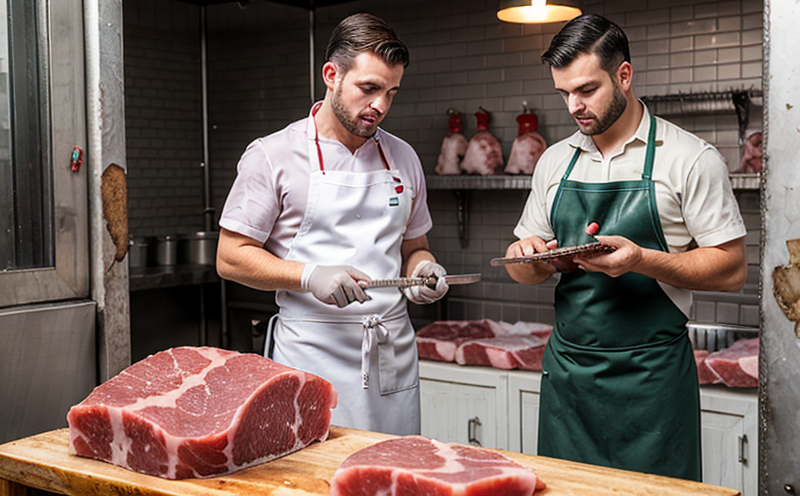Butcher shop hygiene inspection
The importance of hygienic practices in butcher shops cannot be overstated. Food safety and hygiene are paramount to prevent foodborne illnesses and maintain consumer trust. This service ensures that butchers adhere to the highest standards, safeguarding public health.
A comprehensive hygiene inspection involves multiple aspects such as cleanliness, proper handling of raw materials, sanitation procedures, pest control measures, and personal hygiene practices of staff members. These inspections are critical in identifying potential risks early on, preventing contamination, and ensuring compliance with applicable regulations.
Our team uses advanced technology and methodologies to conduct these inspections thoroughly. We employ experienced inspectors who have a deep understanding of food safety principles and local regulatory requirements. This allows us to provide accurate assessments tailored specifically for each establishment.
The inspection process typically begins by reviewing the facility's current practices against relevant standards like ISO 22000:2018, HACCP (Hazard Analysis and Critical Control Points), and local legislation governing food safety. Afterward, an on-site evaluation takes place where we observe operational procedures firsthand.
During this phase, we check various critical points such as the cleanliness of cutting boards and equipment, proper refrigeration temperatures, effective cleaning schedules for surfaces, adherence to safe time-temperature combinations during storage, etc. We also review documentation related to employee training programs focused on good hygiene practices.
It's important to note that maintaining a clean environment goes beyond just visible dirt; it encompasses all stages of meat processing from receiving fresh carcasses through packaging and delivery. By focusing on these areas, we help butchers create an atmosphere where food safety remains at the forefront.
The results of our inspections are detailed in comprehensive reports which include recommendations for improvements if any deficiencies were noted during the evaluation process. These findings serve not only as tools for corrective actions but also valuable resources that can guide future decision-making processes within organizations."
Applied Standards
In conducting butcher shop hygiene inspections, we adhere strictly to international standards such as ISO 22000:2018 and HACCP principles. These frameworks provide a robust framework for implementing food safety management systems that ensure consistent quality and safety throughout the entire supply chain.
- ISO 22000:2018: This standard sets out requirements related to developing, implementing, maintaining, and continuously improving an effective Food Safety Management System (FSMS).
- HACCP Principles: These seven principles are designed specifically for identifying potential hazards early in the process so they can be controlled effectively before causing harm.
By aligning our practices with these recognized benchmarks, we ensure that every butcher shop undergoing inspection receives consistent and reliable results. This consistency is crucial not only because it guarantees fairness but also because it helps establish trust between inspected facilities and regulatory bodies alike.
International Acceptance and Recognition
- The International Organization for Standardization (ISO) has recognized ISO 22000 as the global standard for food safety management systems. Compliance with this standard is widely accepted across Europe, North America, Australia, New Zealand, among others.
- HACCP principles are used by over 145 countries worldwide and have been incorporated into national legislation in many nations including Canada, Mexico, Brazil, China, India, Japan, South Korea, etc.
Our inspections are designed to meet these internationally recognized standards ensuring that butchers gain international credibility. This recognition can enhance their reputation locally as well as attract customers from abroad who value food safety above all else."
Use Cases and Application Examples
| Scenario | Description |
|---|---|
| Newly opened butcher shop inspection | The first step in establishing a new business is ensuring it meets all necessary hygiene standards. Our team conducts an initial assessment to identify any areas needing improvement before official opening. |
| Annual review for established butcher shops | A recurring evaluation ensures that ongoing operations continue to meet required levels of cleanliness and safety. Regular checks help maintain compliance with changing regulations over time. |
| Post-incident investigation following reported contamination cases | In situations where there has been an outbreak linked back to a particular butcher shop, our experts perform detailed investigations aimed at determining root causes and recommending corrective measures." |





